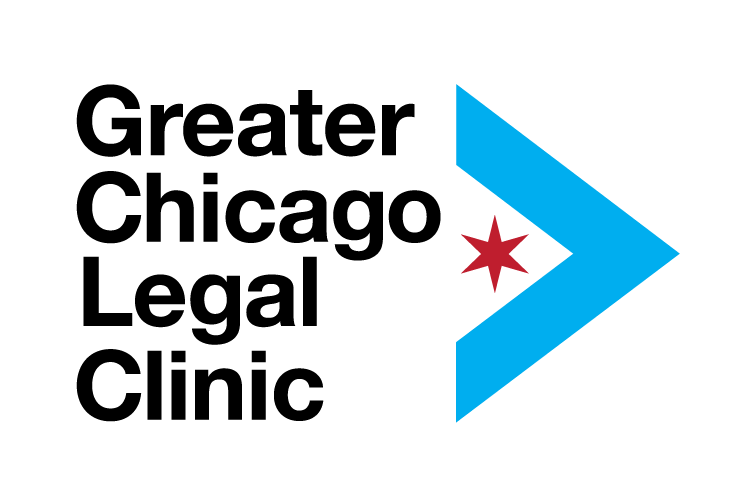New Initiative to Combat Housing Insecurity
The Homelessness Advice and Representation Program (HARP) provides free legal aid services to assist people transitioning from housing crisis to housing security.
From right, Ariel Valdes, Director of Operations, and Katie Jackson, Communications and Outreach Coordinator, review client documents at the first HARP on-site clinic in Oak Park.
“If I can get my record fixed I can get settled with my boys,” Ms. L* said, explaining that her current difficulties securing housing are rooted in a past eviction. “No one wants to rent to me.”
Moments later she sat down with Greater Chicago Legal Clinic attorney Adam Salzman, to discuss available remedies and options.
This was one of a series of conversations that took place in a converted hotel room in early February. The room doubles as a library—overflowing bookcases and comfortable sofas line the walls—and as a community room for the fifty-five individuals and families who live in the building, an interim housing facility in Oak Park, Illinois.
These conversations were part of the first on-site legal clinic organized through the Homelessness Advice and Representation Program (HARP), a new collaboration between GCLC and Housing Forward, an important housing provider in suburban Cook County.
HARP provides free legal aid services to assist people transitioning from housing crisis to housing security.
Based in Maywood, Illinois, Housing Forward realizes its mission to end homelessness through the provision of supportive and rapid re-housing programs; emergency rental assistance to prevent eviction; and wraparound services including interim housing, street outreach, employment readiness, and case management services.
In response to the COVID-19 crisis, Housing Forward converted the Oak Park hotel to serve as interim housing for individuals and small families. It is one of three such facilities in Chicago’s western suburbs.
“Housing insecurity is rising in Cook County,” said Salzman (who is also GCLC’s Executive Director). “We know that 116,00 Cook County households, a number that translates to 242,000 children, are currently behind on rent** and that makes them subject to eviction proceedings.”
Adam Salzman meets with a client at the first HARP on-site clinic in Oak Park.
“We know that legal issues are too often among the types of concerns faced by people experiencing housing insecurity,” Salzman continued. “We also know that meeting people where they are, in the community, significantly helps people access legal aid services.”
These principles informed the planning discussions between leaders of both organizations. Detailed conversations with Housing Forward case managers shaped the program’s outline to ensure it meets the specific needs of their constituency.
Housing Forward case managers, recognizing that program participation is voluntary, promote the availability of free legal aid services to their constituents, and assist in the scheduling and organization of the twice-monthly on-site clinics.
During these clinics, GCLC attorneys meet with Housing Forward’s constituents to determine what is needed on a person-by-person basis. Depending upon the attorney’s assessment, assistance will be provided on-site or the appropriate referral for follow-up services will be made.
As a result of this partnership, individuals and families experiencing housing crisis have access to in-person, on-site, free legal aid services, contributing to Housing Forward’s wraparound services model.
HARP is funded in part by a Kirkland & Ellis Pledge Award, a charitable initiative the firm established to support organizations in the development of new programs to address social justice issues.
“This project brings much needed legal aid services to Chicago’s western suburbs,” said Robert Tucker, COO and Executive Vice President of Programs for the Chicago Community Loan Fund, and long-time Oak Park resident. “Everyone in Oak Park knows and values Housing Forward’s work, and GCLC brings forty years of excellence in legal aid. The expansion of services resulting from this collaboration, by helping families thrive, will make our community stronger.”
*Client names have been changed to protect confidentiality.




